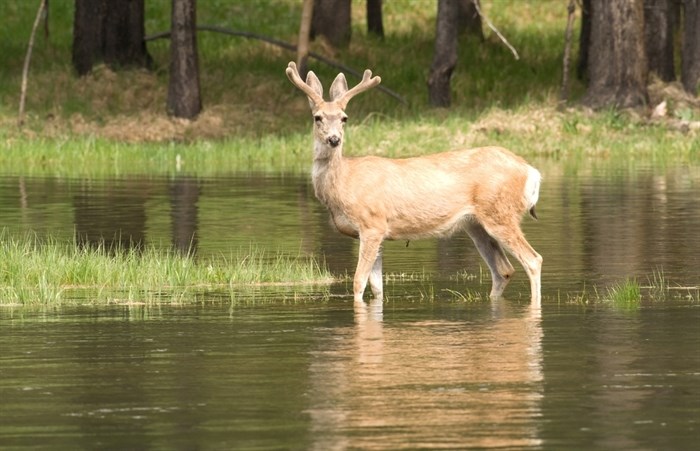
File photo.
Image Credit: Shutterstock
September 25, 2015 - 4:30 PM
“WE HAVE A THREE YEAR LIMIT ON THE PROJECT AND WE STILL NEED OVER 200 SAMPLES”
CHERRYVILLE - They might be off-putting to some, but to a group of government researchers, deer heads from the Cherryville area are the key to stopping a potential disease outbreak in its tracks.
Analyzing the lymph nodes found in the heads can tell scientists whether the animal has bovine tuberculosis — a highly contagious disease that can debilitate deer, moose, elk and cattle, and in rare cases, spread to humans.
In 2011, seven cases of the disease were found in Cherryville livestock. There have been no reported cases since then, but because the disease has no specific signs of early infection, a team of researchers from the Canadian Food Inspection Agency, the Ministry of Forests, Lands and Natural Resource Operations and the Ministry of Agriculture have undertaken an intensive study to ensure it hasn't spread to wildlife in the area.
To complete the study, B.C. Wildlife Veterinarian Helen Schwantje says they are appealing to hunters in the area to drop off the heads from harvested deer, elk and moose.
“We need somewhere in the neighbourhood of 300 samples to get a 95 per cent confidence the disease is not present,” Schwantje says.
Unfortunately, hunter participation in the three-year study (this is year two) has been relatively low so far. In its first year, Schwantje says only about 40 heads were dropped off. Added to another 40 obtained previously, that still leaves a lot of samples required.
“It’s not enough. We need a lot more than that,” Schwantje says. “We have a three year limit on the project and we still need over 200 more samples.”
Each sample gets transported to the Ministry of Agriculture lab in Abbotsford where lymph nodes are taken from the head and subsequently sent to a federal lab. There, tissue cultures are removed and given weeks, if not months, to grow before being tested for the disease. So far, all have tested negative.
There are no known bovine tuberculosis outbreaks in B.C., but there are a couple in Canada — and they’re not pretty. Wood Buffalo National Park in Alberta and Riding National Park in Manitoba both have infected populations.
“It’s almost impossible to control it in the wild,” Schwantje says. “That’s why, if it’s here, we need to stamp it out fast.”
Once established, the impacts of a bovine tuberculosis outbreak are widespread. The disease is highly contagious — particularly in dense populations — and would likely lead to declines in animal populations. The risk of wildlife passing the disease onto domestic livestock is also possible, something that would impact cattle exports and the economy, Schwantje says. Hunters too would feel the effects with new regulations and reduced access to healthy, disease-free animals.
“The expense of having to clean up a disease like this is astronomical,” Schwantje says. “It means either culling animals, or testing and killing disease-positive animals. It’s time consuming, expensive, and puts other species at risk.”
While all samples have so far come back negative, researchers won’t know for sure the area is clear until they get more heads. With the clock ticking on the three-year project, Schwantje isn’t sure what they will do if hunters don’t step up. Culling animals for research is an option, but she’s hoping hunters will come through before that avenue has to be explored.
Hunters are encouraged to drop off heads at collection freezers set up at at Frank's General Store (1139 Highway 6, at the junction of Sugar Lake Road and Highway 6), RT Ranch Sausage and Custom Cutting (39 Byers Road, off Highway 6, between Lumby and Cherryville), or the province's district office in Penticton (102 Industrial Place, Penticton).
“It’s in everybody’s interest to ensure our wildlife is healthy,” Schwantje says. “This is a disease we can sample for and theoretically, we could do something about it if we find it early enough.”
To contact the reporter for this story, email Charlotte Helston at chelston@infonews.ca or call 250-309-5230. To contact the editor, email mjones@infonews.ca or call 250-718-2724.
News from © iNFOnews, 2015